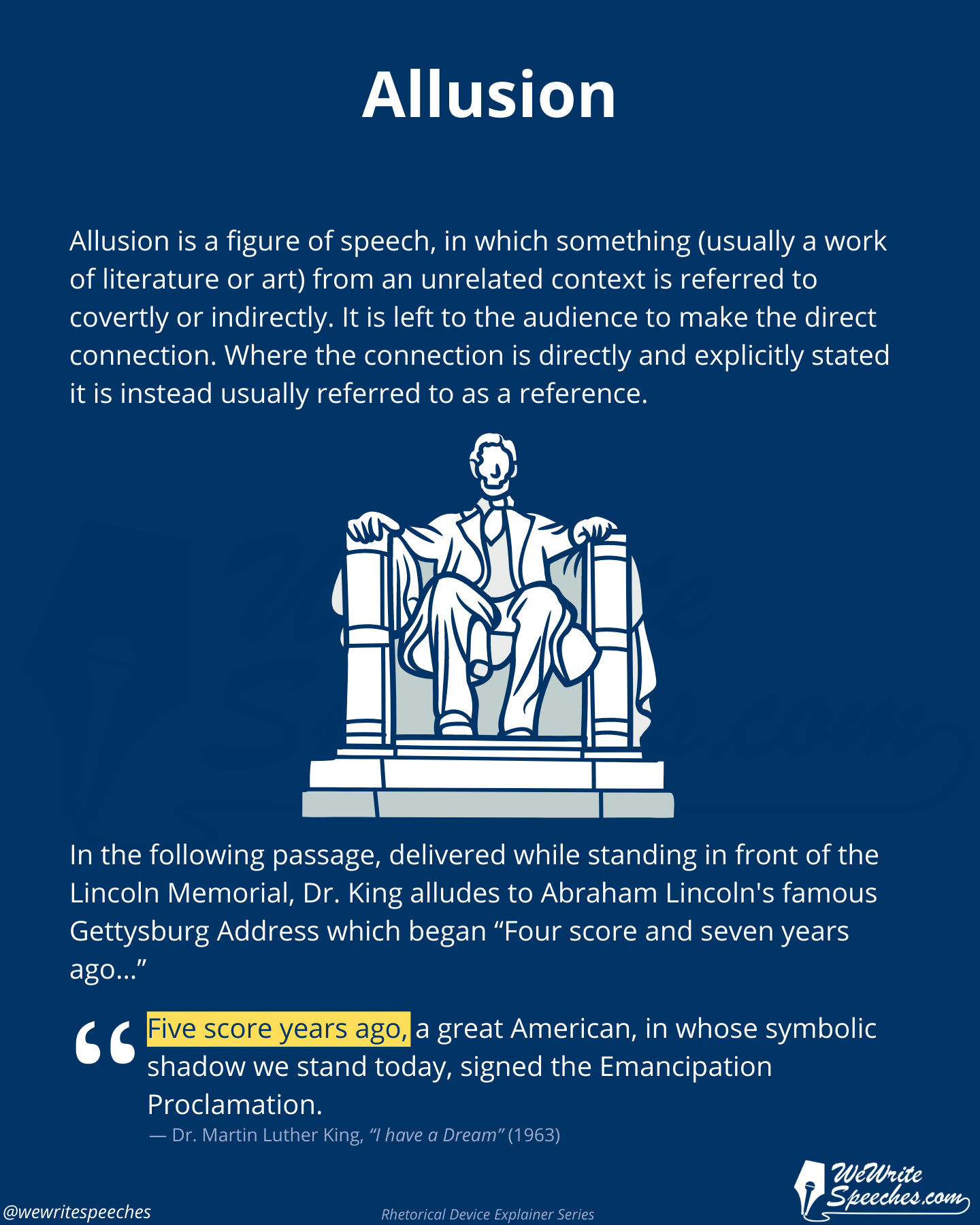Rhetorical Device: Allusion
An allusion is a rhetorical device commonly used in public speaking to add color or depth to a speech by making a comparison or reference to a person, event, or other source of information. An allusion is a hint or clue that allows the audience to draw their own conclusions rather than be explicitly told by the speaker. To make a stronger impact, allusions can make use of historical, political, religious, and cultural references. Speakers can strengthen the message of their speech by using allusions to create a bridge of understanding between themselves and their audience.
Examples
Here are a few allusions most people will be familiar with (hover/click on the highlighted section to see details of what it alludes to):pop culture
- Don't look now. Over by the bar.. It's he who must not be namedan allusion to Voldemort from the Harry Potter books and films, your ex!
- He thinks he can do anything. Next, he will be
wearing his underwear on the outsidean allusion to Superman
classical mythology
- I'm warning you.. If you publish that article, you are
opening Pandora's boxan allusion to the first human woman created by the Greek gods, who released evil into the world.
- you look like you are
carrying the weight of the world on your shouldersan allusion to Atlas, the titan from Greek mythology who was condemned to hold up the sky for eternity.

literature
- This promotion has turned out to be a
poisoned chalicean allusion to Shakespeare's Macbeth.
Allusions used in well known speeches
Fourscore and seven years ago This is an allusion to the signing of the Declaration of Independence but it also echoes the archaic language of the Bible (Psalms 90:10) which describes a human lifespan as "threescore years and ten". our fathers brought forth on this continent a new nation, conceived in liberty and dedicated to the proposition that all men are created equal Here he is alluding to the U.S. Declaration of Independence.. Abraham Lincoln, "The Gettysburg Address" (19 November 1863)
I am happy to join with you today in what will go down in history as the greatest demonstration for freedom in the history of our nation.
Five score years agohe is echoing the language at the start of Lincoln's Gettysburg Address (whose giant statue he is standing in front of as he delivers this speech)., a great American, in whose symbolic shadow we stand today signed the emancipation proclamation.Martin Luther King, Jr., "I Have a Dream" (28 August 1963)
Well, I don't know what will happen now. We've got some difficult days ahead. But it really doesn't matter with me now, because I've been to the mountaintop.This is biblical allusion. It alludes to Deut 3: 23-27 where Moses asks God to cross the Jordan river and enter the "promised land". God allowed Moses to view the land from a distance, from on top of a mountain, but denied him the satisfaction of being able to physically enter it. And I don't mind. Like anybody, I would like to live a long life. Longevity has its place. But I'm not concerned about that now. I just want to do God's will. And He's allowed me to go up to the mountain. And I've looked over. And I've seen the Promised Land. I may not get there with you. But I want you to know tonight, that we, as a people, will get to the promised land!This is biblical allusion. It alludes to Deut 3: 23-27 where Moses asks God to cross the Jordan river and enter the "promised land". God allowed Moses to view the land from a distance, from on top of a mountain, but denied him the satisfaction of being able to physically enter it. And so I'm happy, tonight. I'm not worried about anything. I'm not fearing any man! Mine eyes have seen the glory of the coming of the Lord!These words are the opening of the "Battle Hymn of the Republic", an American patriotic song written by the abolitionist writer Julia Ward Howe during the American Civil war. The song links the Civil War with the judgment of the wicked at the end of the age and contains several biblical allusions such as to Isaiah 63:1–6 and Revelation 14:14–19 Martin Luther King, Jr., "I've Been to the Mountaintop" (3 April 1968)
